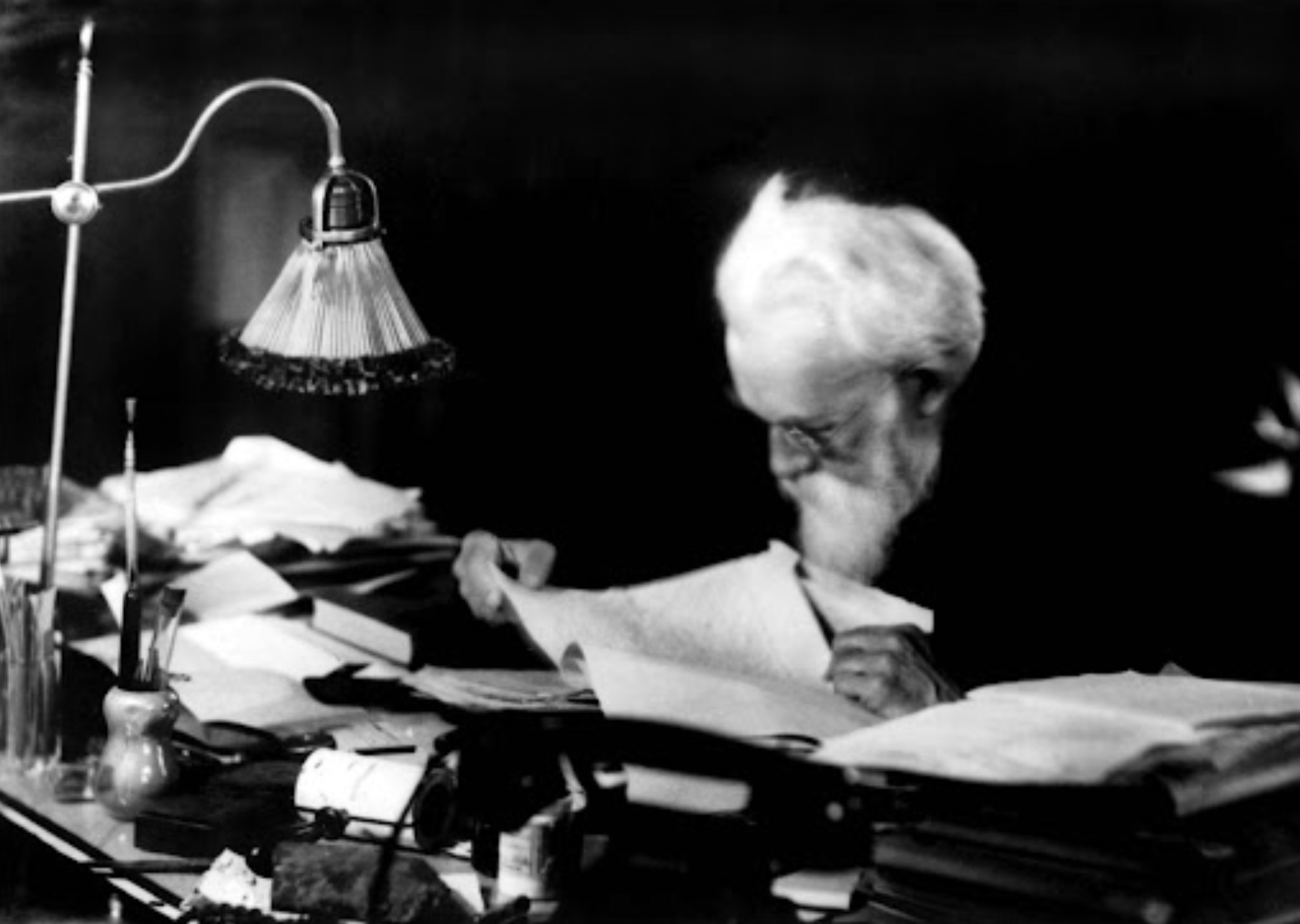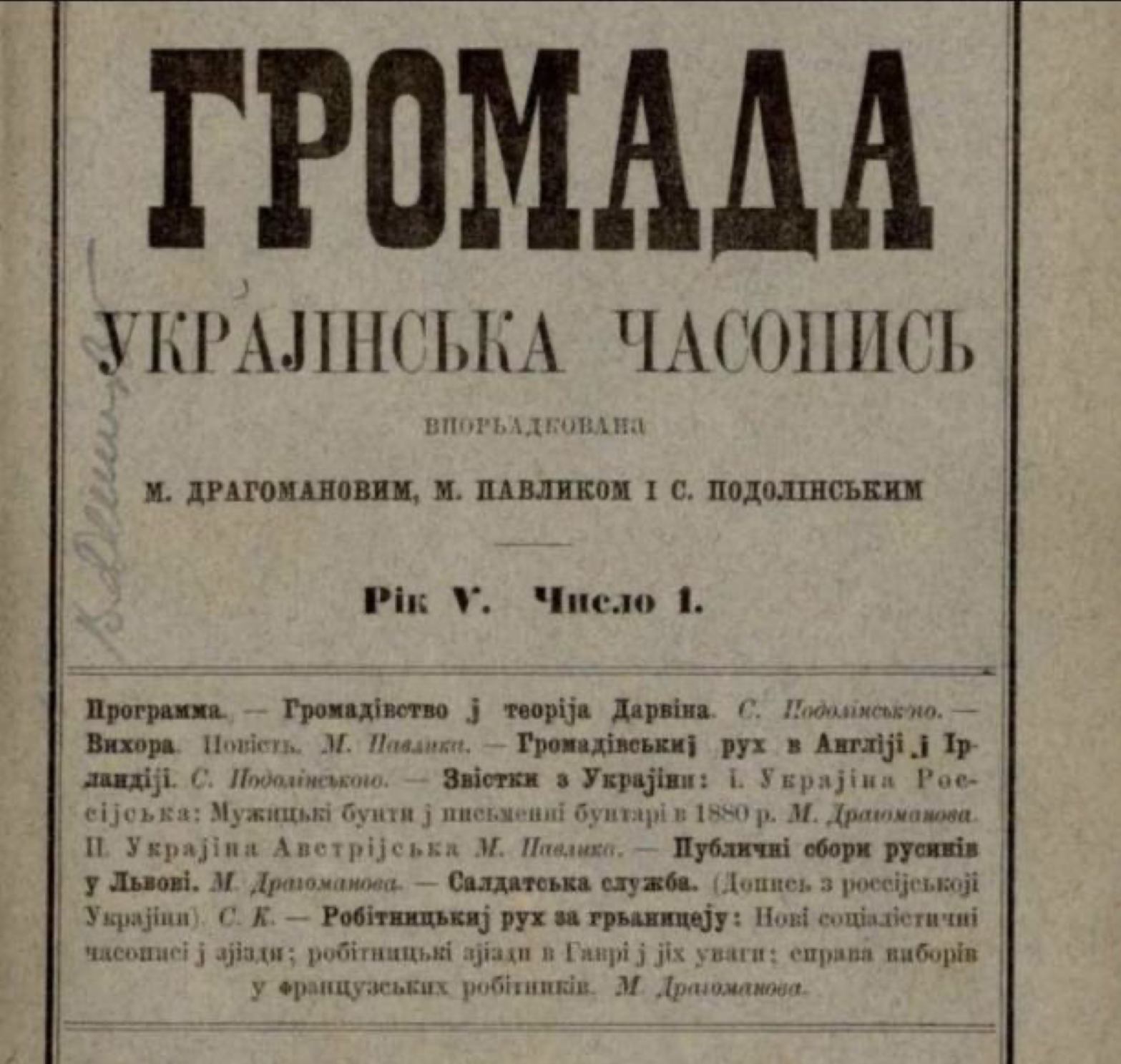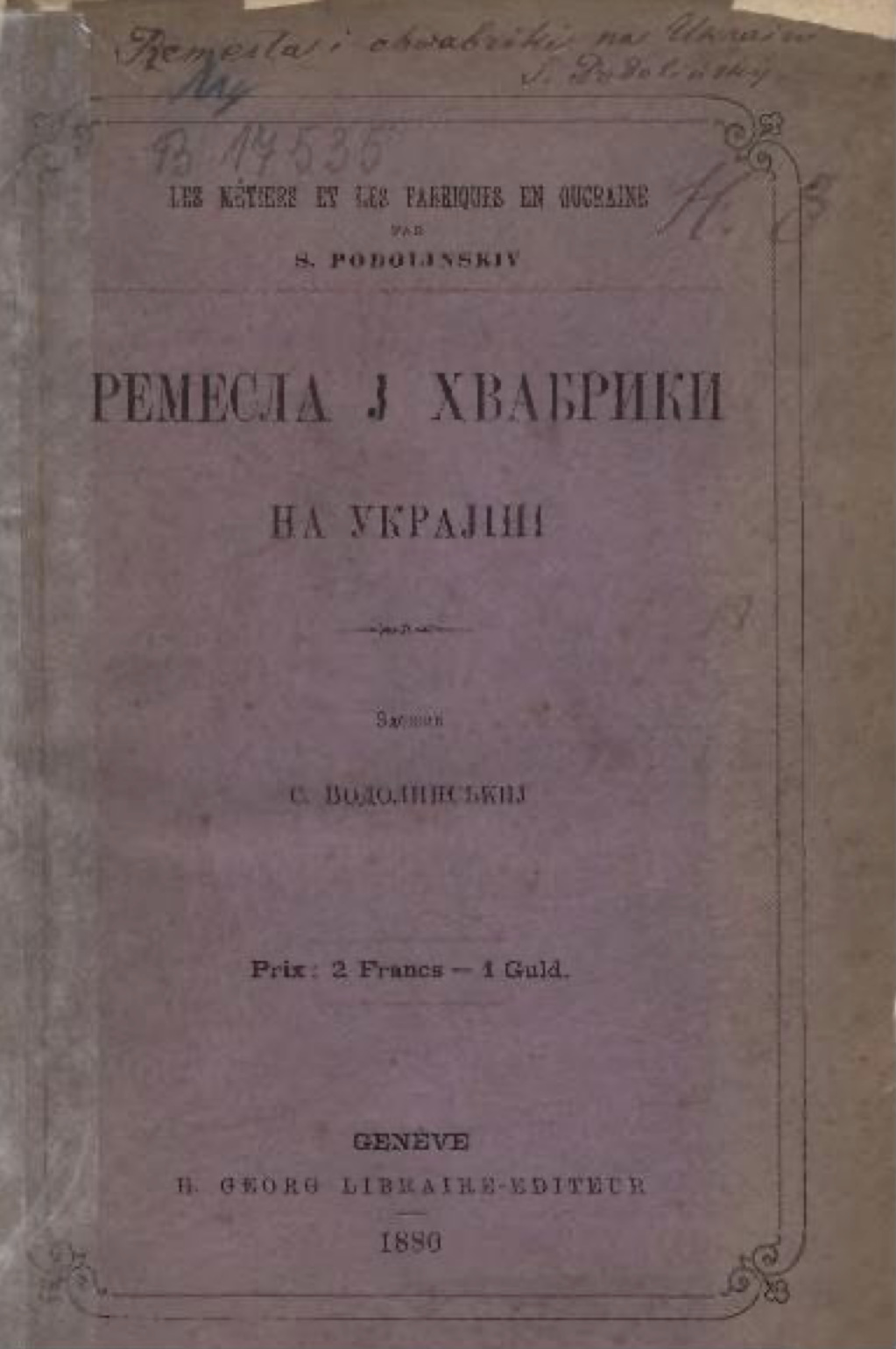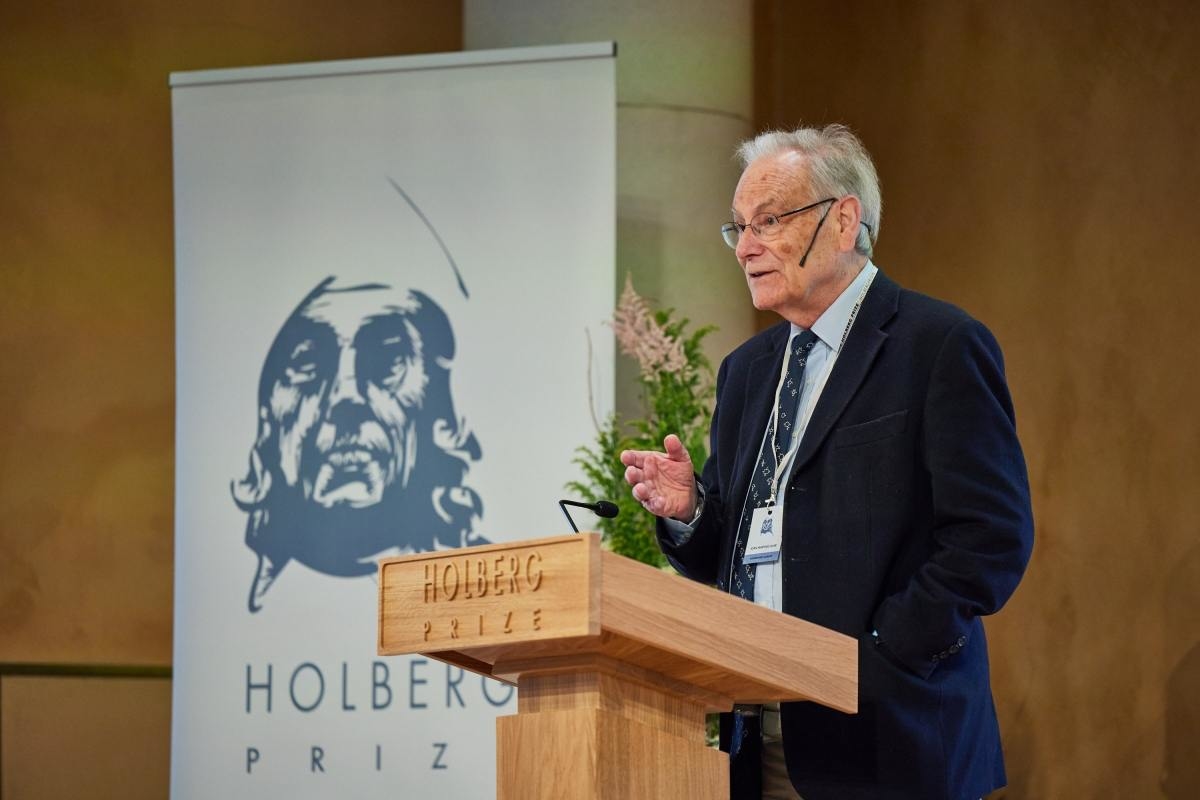Serhii Podolynsky (1850-1891) is a paradoxical figure. A semi-forgotten Ukrainian sociologist (in Ukraine, not abroad), he is perhaps one of the most original Ukrainian social theoreticians of the 19th century. His impact is significant but understudied. Revolutionary agitator, profound researcher, madman – what is the most important in his life? Drahomanov collaborated cautiously with this emotional anarchist. Mykhailo Hrushevsky and Mykyta Shapoval included Podolynsky among the founders of Ukrainian sociology, and his work was popularized by the first president of the Ukrainian Academy of Sciences Volodymyr Vernadsky. His ideas were inspirational also for Joan Martinez-Alier.
This interview is prepared as part of the conference “Potential Classics: Superseded, Forgotten, and Uncovered in the History of Ukrainian Sociology'' (June 5-6, 2024) organized by Ukrainian Sociological Journal SVOIE and the Faculty of Sociology at the Taras Shevchenko National University of Kyiv (alma mater of Serhii Podolynsky). This first ever conference in Ukraine with a special focus on the history of Ukrainian sociology gathered researchers from Ukraine and abroad.
Joan Martinez-Alier (born in 1939) is world-renowned Catalan social scientist, one of the founders of ecological economics and political ecology, whose ideas laid the foundation for the so-called Barcelona School. He has been awarded the Balzan prize and the Holberg prize.
The first is one of the most prestigious prizes in the social sciences and humanities in Europe while the second one is often compared to the Nobel prize in social sciences. In both lectures, delivered on the awarding occasions, prof. Martinez-Alier mentioned Serhii Podolynsky. Prof. Martinez-Alier was planning to present a report dedicated to Serhii Podolynsky, but circumstances did not allow it. This interview replaced his report. The general overview of the ideas of Barcelona School and the role of Podolynsky’s legacy in its formation was presented by Volodymyr Shelukhin in the column for VoxUkraine.
In this text we use the contemporary Ukrainian spelling of his name – Serhii Podolynsky (you may also find Sergey Podolinsky or Serhiy Podolynsky).
You learned about Serhii Podolynsky from a book by Volodymyr Vernadsky, but how did this book come to your attention? It’s somewhat unexpected for a social scholar to read a book on geochemistry.
Between 1979 and 1982 I published with Jose Manuel Naredo[1] (in Spanish, Catatan and then in English an explanation of Podolynsky's agricultural energetics in the Journal of Peasant Studies. I compiled a table summarizing the numbers — kilocalories as inputs and outputs —in Podolisnky's article. Later, in 1986, when I was preparing my book Ecological Economics (1987), my friend Jacques Grinevald[2] pointed out a book by Vernadsky titled La Geochimie (1924), and to the pages talking about energy and entropy with a half page eulogy to Podolynsky.

Volodymyr Vernadsky (1863-1945), the first president of Ukrainian National Academy of Sciences, geologist and philosopher, inventor of geochemistry, radiogeology, and biogeochemistry, The author of noosphere conception was also promoter of Serhii Podolynsky's ideas. Picture: Укрінформ
By the 70s Podolynsky was largely forgotten, and one of his main articles was published in English only in 2004. What sources did you use when studying Podolynsky’s legacy alongside Vernadsky’s book?
Podolynsky's article on agricultural energetics of 1880 was published in Italian, German which I can read, also in Russian (in Slovo journal) and probably in Ukrainian, which I cannot read unless I get help. And much later it was translated into English. There are slightly different versions of the same article.
Were you aware of Roman Serbyn’s study? What kind of intellectual environment was Podolynsky part of?
Yes, I am aware of Roman Serbyn 's work. We corresponded many years ago. Podolynsky wrote about Ukrainian economic history, he was one of a group of Ukrainian intellectuals opposed to Tsarist Russia. There he was close to Piotr Lavrov, who was a narodnik, a political stream favorable to the peasantry, and against Tsarism. Podolynsky also met Karl Marx in person, briefly. In 1880 he was living in exile in Montpellier. He had studied medicine in Breslau (Wroclaw) and in Zurich. It is really a pity that he fell ill and died young. Also he had friends from the Narodnaya Volya group, although I would say he was a Ukrainian nationalist. Ukrainian universities in Kyiv, in Lviv, bear the names of Mykhailo Drahomanov, Ivan Franko — these were Pdolynksy's friends and sources of inspiration.

The Ukrainian exile journal "Hromada" (Community) with the name of Serhii Podolynsky among editors, the third alongside Mykhailo Drahomanov and Mykhailo Pavlyk
In some sense, Serhii Podolynsky was an unusual thinker for the 19th century. His focus on nature and agrarian relations in the age of industrialization, railroads, and steam engines seemed somewhat old-fashioned.
Podolynsky had a very good education in the sciences. This is why he could write his article on agricultural energetics. He closely followed the research on energy, thus in his work he quotes Moleschott, Clausius. So, he could do his calculations of the amount of energy from the sun converted into photosynthesis, and how this amount increased (in his view) when the work of humans and animals was applied in agriculture. The surplus increased (the Mehrarbeit[3], he wrote in German to Marx in 1880). But a lot of the goods were produced naturally, without human work (production in the physical sense, measured in kcal).
All this was rather new still by 1880. In Europe Podolynsky's articles were published in several languages and in various journals, including the Marxist Die Neue Zeit, but Marxist authors were not that interested. They did not write on agricultural energetics. Some ecologists, much later — David Pimentel, Howard T. Odum in the 1970s — begun to write on the ecological energetics of the human economy, and on the EROI of agriculture (the ratio between the energy coming into a field and the energy of the crop). Today this is of interest in ecological economics.

The title page of Serhii Podolynsky's 1880 book published in exile Geneva Ukrainian printing house "Hromada" in Ukrainian. The book dedicated to socio-economic history of Ukraine. Picture: Diasporiana
Some Orthodox Marxist authors are skeptical of your interpretation of Podolynsky’s legacy and its relation to Marxian views. Their main argument is that we cannot explain Podolynsky in terms of the ecological turn in the social sciences because he perceived nature merely as a complex of resources. He had a consumerist view of nature. How do you respond to this critique?
Marx and Engels in 1880-82 (Marx died early in 1883) read copies of Podolinsky's articles on the energetics of agriculture. They did not think this was interesting for the study of society and economy. As Engels wrote to Marx, Podolynsky had tried to analyze the economy from a physical point of view, and this was wrong. There are some Marxist scholars who seem to believe that Engels himself could never be wrong. I disagree.
What contemporary theories in economics, sociology, and related fields might align with Podolynsky’s approach?
Podolynsky was ahead of his time because he developed a model of biomass production based on realistic figures from the production and the inputs of agriculture, expressed in energy units, i.e. kilocalories per hectare. Kilocalories are relevant in the input side (photosynthesis plus human and animal work, also the seeds, the fertilizer and nowadays the petroleum etc) and in the output side. Adult humans eat approximately between 1800 to 2500 kcal per day. As Vernadsky wrote in 1924: "Podolynsky understood the energetics of life and tried to apply his findings to the study of economy". In other words, he looked at the social metabolism of agriculture, and his model could be applied to the whole economy. He has been recognized as a precursor of agricultural energetics and also of ecological economics.
The field of energy research and social sciences, and also energy research and economic and social history, developed to some extent separately from his insights. The reason for that is his early death and a Marxist scholar's neglect of his work due to Engels' negative remarks in correspondence with Marx, first published in 1919. But he was not forgotten. My articles with Naredo in 1982 in the Journal of Peasant Studies and my book of 1987 made him well known to the new school of ecological economists. Also to ecological anthropologists. For instance, Roy Rappaport published in 1968 a book on the agricultural energetics and the social system with the religion of a group of people, the Tsembaga Maring, in New Guinea. I read it in 1972, before I knew about Podolynsky's article and Engels' reaction. In fact, I taught about energy and agriculture even before Howard T. Odum and D. Pimentel published their articles and books on this topic after 1971.

Joan Martinez-Alier is delivering a Holberg Lecture in 2023. Picture: Holbergpizen
So, I conclude that Podolynsky approach is very relevant for the growing fields of environmental social sciences and for environmental history[4]. You must be aware, however, that terms like "agricultural energetics", "social metabolism", "the energetics of life", "the entropy law” and the “economic process" are still almost unknown to mainstream economists and sociologists.
Agree, are still unknown, but the concept of entropy is used by a limited group of social scholars inspired by synergetics. Were they aware of Podolynsky ideas?
I do not know about synergetics. You should try to read Georgescu-Roegen, “The Entropy Law and the Economics Process” (1971). Georgescu-Roegen mentioned Podolynsky, not in his book of 1971, he mentioned him in the following article: Georgescu-Roegen, N. (1986). “The Entropy Law and the Economic Process in Retrospect”, Eastern Economic Journal, Vol. XII, No. 1, p. 3-25
By 1986 Georgescu-Roegen, whom I had met in 1979 for some days in Barcelona, had read my work with Naredo on Podolynsky, and also he knew the first drafts of my 1987 book, Ecological Economics. This is where he learnt about Podolynsky. By the way, much of the information on Podolynsky's agricultural energetics, Marx and Enegsl reactions, and Vernadsky's reception, are explained in my book Ecological Economics (1987, new edition of 1990).
Your current research project focuses on ecological conflicts around the globe. The ongoing Russian invasion of Ukraine also has a tremendous effect on the environment. Although you have not yet studied the Ukrainian context, could you offer some general advice for Ukraine on how to address these new ecological challenges? Is it possible to build a growing economy in harmony with nature and ecological thinking?
Yes, with the EJAtlas, which is a collective endeavour, we try to show that there are many local struggles for environmental justice. Economic growth sometimes means pollution and destruction of the environment. In these movements, people have similar enemies (for instance, big mining firms). I was recently reading about complaints in Serbia against copper mining and smelting in Bor, against the Chinese company Zijin. There are hundreds of similar conflicts. Often, these are transnational companies. Also, in Serbia, ordinary people complained against the company Rio Tinto (against lithium mining). Economic growth, in all countries, should not imply the destruction of the environment. The same will apply to Ukraine when peace comes back.
Interviewed and notes by Volodymyr Shelukhin.
Примітки
- ^ José Manuel Naredo (born in 1942) is a Spanish ecological economist, critic of GDP conception and like Prof. Martinez-Alier is a promoter of the degrowth movement – an approach that denies economic growth as the only measure for social progress.
- ^ Jacques Grinevald (born in 1946) is a French philosopher-epistemologist, ecologist, and historian of sciences, co-author of anthropocene conception.
- ^ Literally “surplus labor”.
- ^ This field emerged in Ukraine later, but with great influence of Podolynsky’s ideas. The first text in the field that could be mentioned is Olena Apanovych’s (1919-2000) article “Lord follows the plow: agriculture of Ukrainian peasants and cossacks in the light of Serhii Podolynsky and Volodymyr Vernadsky’s ideas” (1999). Dr. Apanovych studied Vernadsky’s archive which led her to Podolynsky’s works.
